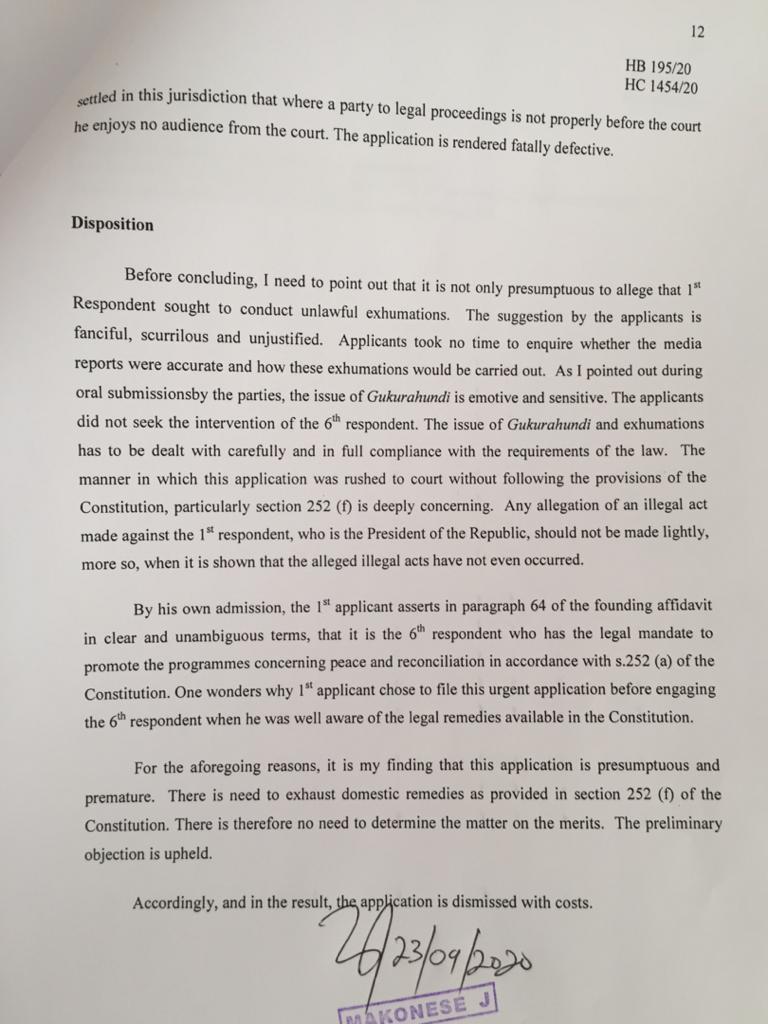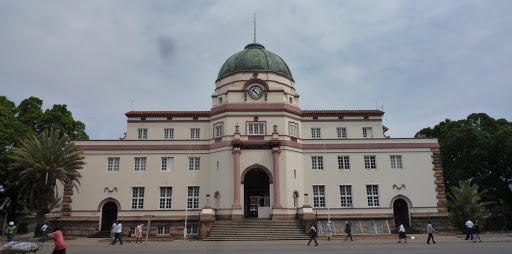The High Court, Friday, dismissed with costs, an application by activists to stop the government from conducting Gukurahundi exhumations and reburials, ruling that the applicants had to exhaust domestic remedies first before rushing to the courts.
In his judgment, Bulawayo High Court Judge, Justice Martin Makonese said the applicants failed to comply with Section 252 (f) of the Constitution before approaching the court.
“Before concluding, I need to point out that it is not only presumptuous to allege that President Mnangagwa sought to conduct unlawful exhumations. The suggestion by the applicants is fanciful, scurrilous and unjustified,” he said.
A Gukurahundi survivor and activist Charles Thomas, ZAPU and Ibhetshu LikaZulu sought an interdict on August 29, 2020 (Case No 1454/20) to stop the government and Matabeleland Collective from conducting Gukurahundi exhumations and reburials.
The applicants wanted the government to stop reburials arguing rhat the process cannot be handled by people implicated in the massacres.
President Emmerson Mnangagwa was cited as the first respondent, while Minister of Home Affairs and Cultural Heritage, Kazembe Kazembe was the second respondent.
Matabeleland Collective was the third respondent, Jenni Williams (leader of the Matabeleland Collective the fourth respondent while Chairman of the National Peace and Reconciliation Commission (Retired Judge Sello Nare) and the National Peace and Reconciliation Commission (NPRC) were fifth and sixth respondents respectively.
The applicants’ lawyer, Nqobani Sithole, had in court said the government’s plans to exhume and rebury the Gukurahundi victims was publicised in the media including a government owned newspaper, which mentioned it would start in September.
However, the state argued the government did not announce it was planning to conduct reburials of Gukurahundi victims.
Justice Makonese said the applicants did not take time to ask whether the media reports were accurate and how these exhumations would be carried out.

“As I pointed out during oral submissions by the parties, the issue of Gukurahundi is emotive and sensitive. The applicants did not seek the intervention of the 6th respondent (NPRC),” he said.
“The issue of Gukurahundi and exhumations has to be dealt with carefully and in full compliance with the requirements of the law. The manner in which this application was rushed to court without following the provisions of the Constitution particularly section 252 (f) is deeply concerning,” said Justice Makonese.
Justice Makonese added, “Any allegation of an illegal act made against the first respondent, who is the President of the Republic, should not be made lightly, more so when it is shown that the alleged illegal acts have not even occurred.
“By his own admission, the 1st applicant (President Mnangagwa) asserts in paragraph 64 of the founding affidavit in clear and unambiguous terms that it is the 6th respondent who has the legal mandate to promote the programmes concerning peace and reconciliation in accordance with Section 252 (a) of the Constitution.
“One wonders why the first applicant (Charles Thomas) chose to file this urgent application before engaging the 6th respondent (NPRC) when he was well aware of the legal remedies available in the Constitution,” ruled Justice Makonese.
The judge noted it was his findings that the application was presumptuous and premature.
“There is a need to exhaust domestic remedies as provided in Section 252 (f) of the Constitution. There is therefore no need to determine the matter on merits. The preliminary objection is upheld. Accordingly, and in the result, the application is dismissed with costs,” said Justice Makonese.
President Mnangagwa and Kazembe were represented by Rejoice Hove from the Attorney General‘s office while Nqobani Sithole represented the applicants.
NPRC was represented by Maclean Mahaso while Williams and the Matabeleland Collective were Self- Actors.
Ibetshu Likazulu Coordinator Mbuso Fuzwayo hinted that the applicants might consider appealing Justice Makonese’s ruling.
“We will study the judgment. If it does not protect the victim and working for the perpetrator we might appeal the judgment. The judiciary is now a weapon to silence anyone opposed to misgovernance that’s why there are costs,” said Fuzwayo in an interview.

